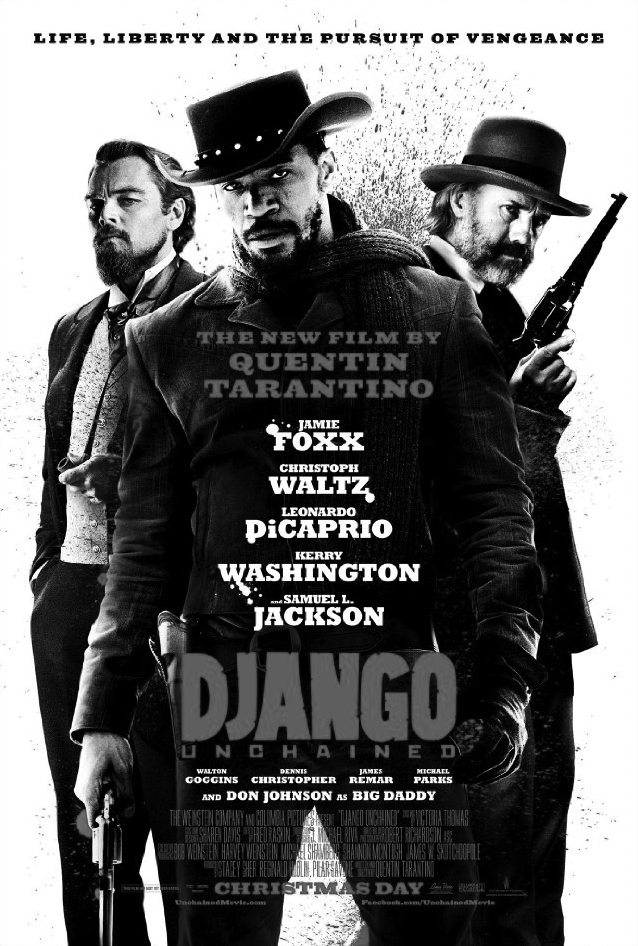
I’d like to begin this review by saying that “Django Unchained” was my favorite movie of 2012. Quentin Tarantino’s latest is equal parts fairy tale and grotesque spectacle, blown to truly epic proportions. Like similarly huge works before it, it sparked controversy prior to even hitting theaters, but was duly rewarded at this year’s Academy Awards with Best Original Screenplay for Tarantino and Best Supporting Actor for Christoph Waltz.
“Django” opens in the antebellum South, as a group of slaves are marched through a dark forest. From this darkness emerges Dr. King Shultz (Waltz) riding in a dentist’s wagon topped with an absurdly large bobbing tooth. He’s looking for a slave named Django (Jamie Foxx), whose assistance he requires in identifying a trio of wanted brothers from Django’s past. The good doctor speaks with characteristic Tarantino verbosity and buys Django’s freedom, shoots up the slavers and points out the North Star to the remaining slaves. With that done, he’s on his merry way.
The doctor, we soon learn, is not so much a practicing dentist as a successful bounty hunter and forward thinking opponent of slavery (a convenient plot loophole for Tarantino) and for a time, Django becomes his business partner. Along the way, Django reveals his quest to rescue his beloved wife, Broomhilda (Kerry Washington), from her new owner and Shultz offers his help.
Broomhilda is not the property of just any plantation owner. She has been sold to the monstrous Calvin Candie (Leonardo DiCaprio), sadistic proprietor of Candyland, the largest and most dreaded plantation in the area. Based on this knowledge, Shultz and Django come up with a gutsy plan to get them on Candie’s good side, but whether they’ll successfully fool Candie’s sniveling, self-loathing slave-butler, Stephen (Samuel L. Jackson) is another question entirely.
Tarantino has been soundly criticized by many for the flagrant use of the N-word (over 100 times in this film), as well as the proliferation of disturbing imagery, even by his own standards. “Django” absolutely deserves its R-rating, but I for one disagree with stances that the film is too flippant about the ever-present American issue of our national slave-owning past. Honestly, the N-word would have been standard vernacular for most of the antebellum South well into the twentieth century. Also, the most startling and uncomfortable role in “Django” casts Jackson as a traitor to his own race, serving as a brutal reminder of minority enforcement from within the minority itself. Jackson plays the part brilliantly, and the effect of his combined performance with DiCaprio (who is very possibly at a career-best as Candie) is blood-chillingly awful. Scenes of slaves fighting to the death for their owners’ pleasure and of a man being eaten alive by hounds are juxtaposed against Django’s heroism and shows of bravado that are necessary reminders that the backdrop of that familiar tale of rescuing a fair maiden in distress is catalyzed, not by some evil witch or overprotective parent, but by the violence inherent in the system of slavery. Critics seem unilaterally to agree that “Django” more closely approaches the goal Tarantino set out to achieve in “Inglourious Basterds” and the result is a more mature, if similarly eccentric, final product.
But what should not be forgotten, above all, when watching “Django Unchained” is the amount of fun Tarantino invariably has with his films. It is at turns madcap and deadly serious, but it has that irrepressible je ne sais quoi which keeps audiences returning again and again to see explosions, bloodbaths and general mayhem, and really, who could do it better?



















